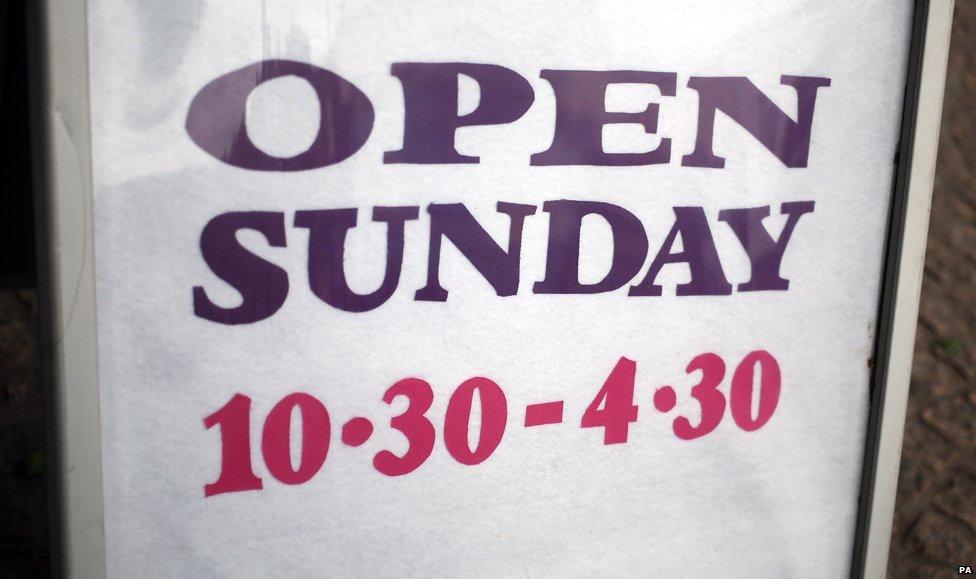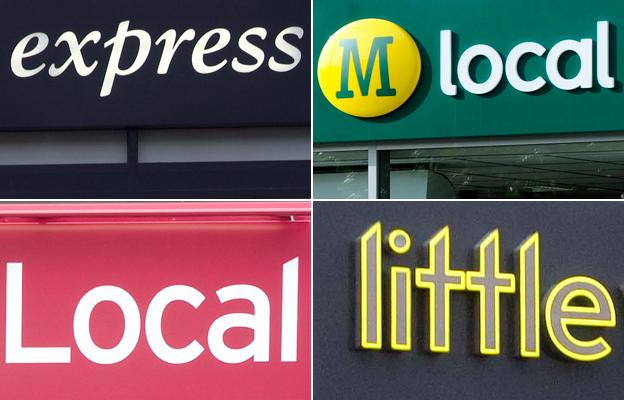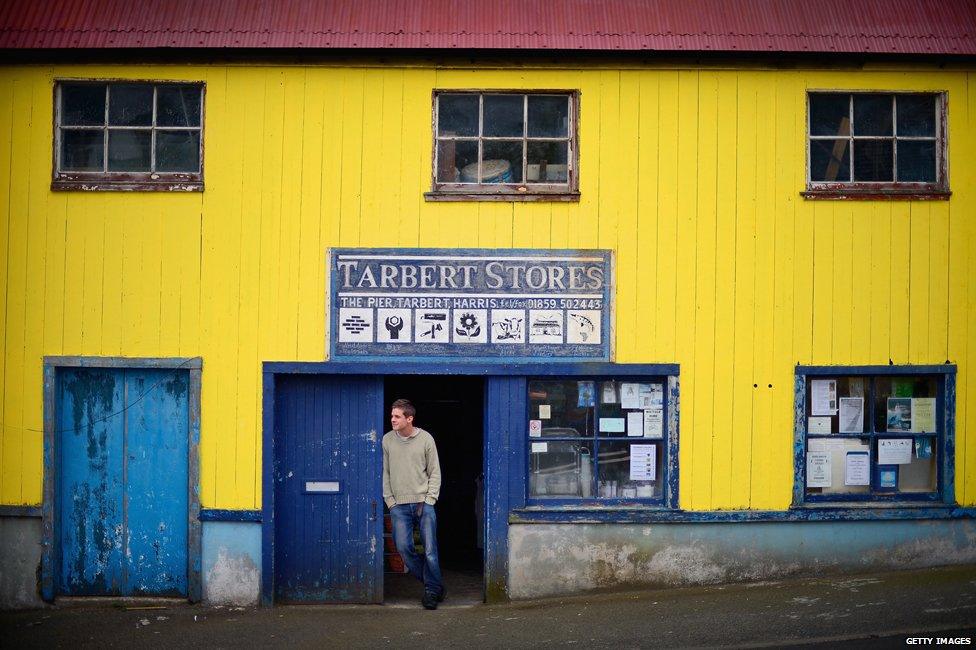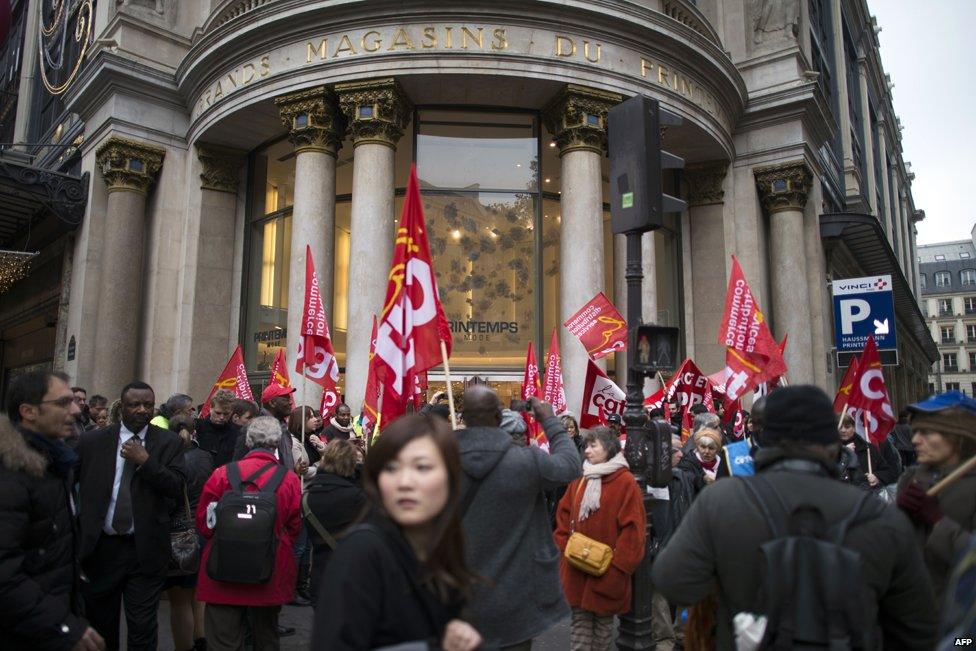10 quirks of Sunday opening
- Published

Chancellor George Osborne is planning to relax a 21-year-old law about shopping on a Sunday. Here are 10 quirks of Sunday trading.
Until 1994, most shops in England and Wales were banned from selling anything on a Sunday.
Then the controversial Sunday Trading Act of that year opened the floodgates on the traditional day of rest.
But not everywhere. The majority of large shops - those over 280 sq m (3,000 sq ft) - were only allowed to open for six hours, external on a Sunday.
Now Chancellor George Osborne is expected to unveil plans in the new Budget to open the door for supermarkets and other large stores to trade throughout the day.
Here are some of the quirks of Sunday trading in England and Wales.
1. "Browsing time"
To make the most of their six hours, retailers invented the idea of "browsing time". The doors of the shop open 30 minutes or so before the tills open. Shoppers could find themselves queuing inside B&Q with a full trolley at 09:58, waiting for the cash register to start whirring.
"If [stores] didn't even open the door until the time when they could first make the transaction, they could be standing idle for a full 30 minutes or more while shoppers fill up their trolleys," says retail expert Clare Rayner.
The most common amount of "browsing time" is about half an hour, Rayner says. "[Stores] will have determined the optimal amount of time," says Rayner. "They will have observed the average amount of time that a customer spends collecting items and then approaching the till."

2. Shops that never open on Sundays
There are still shops that never open on a Sunday. The Entertainer chain of toy stores has 102 shops throughout the UK that don't even open on the Sundays in the run-up to Christmas.
"Sunday trading is not simply about money or commerce - we have seen significant year-on-year growth by trading six days a week," explains Gary Grant, founder and managing director. Grant is a Christian but has argued the company's stand is for the wider benefit of the staff.
"There are many reasons for this, one of which is the 'day of rest' every member of The Entertainer staff gets to enjoy with their loved ones - including the Sundays before Christmas."
It's a difficult decision for businesses to stay closed, as they are losing out to competitors. "My personal take on it is that it's potentially commercial suicide in this day and age because if you're not open it aids your competitors," Rayner says. But there are a number of possible reasons for staying closed, she says, including religious or ideological ones. "Smaller businesses often elect not to open on a Sunday because they're family-run and they want to protect family time."
3. Time and a half has slowly disappeared
At the start of Sunday working, extra pay was used to entice staff.
Staff don't have to work on Sundays if they started at their current employer before 26 August 1994, when the act was introduced. But there's no obligation for higher pay, external unless it's written into the contract.
Many companies paid their workers an extra 50% for the hours they worked on Sundays in the 1990s. But at many companies that higher rate has disappeared.
The removal of a "Sunday premium" for Next workers caused a row in May this year. The company had actually stopped writing Sunday premiums into new contracts since 2008 - but the controversy arose, external when they sought to move all their workers onto the same contract.
It was part of a gradual phase-out. Between 1994 and 2001, Next workers were paid "time and a half" for Sundays. That then became "time and a quarter" for contracts signed between 2001 and 2006. Finally it was reduced to 10% extra until 2008, when it was removed completely, explains Next's spokesman.
"As the world has changed, working on a Sunday has become normal," he says. "It was no longer justifiable that [for] two people doing the same job, one was receiving a premium."
A similar move by Boots in 2011 was ruled unlawful by a tribunal, external the following year.

Supporters of Keep Sunday Special campaign, in 1988 - from left, David Blackmore, Barrington Williams, Ivor Stanbrook and Dr Michael Schluter
4. Exceptions for Jewish shops
Not all large stores are limited to six hours.
Among the exemptions, external are big Jewish retailers, which have been allowed to open on Sundays since even before the 1994 Act.
It makes sense. Sundays were originally designated as a "day of rest" for religious reasons. And whereas Sunday is the holy day in Christianity, Jewish people observe the Sabbath from sunset on Friday until Saturday evening.
No work is supposed to be done at all during that time - so clearly no shops can open.
The law acknowledges this. Large businesses can declare as Jewish to the local authority and thereby not be subject to the same Sunday restrictions.
The stipulation - should anyone wish to skirt the law - is that the shop remains closed during the Jewish Sabbath. For shops owned by a partnership or company, the majority of partners or directors must be Jewish in order to be considered a Jewish business. The law also applies to people of other religions who observe the Jewish Sabbath.
5. Variable opening times

There's an eight-hour window - 10am-6pm - in which the big shops can have their six hours of opening.
Tesco's most common Sunday opening hours are 10am-4pm, says a spokesman. But it varies across the England and Wales. "We decide opening hours based on customer research and local factors [such as] opening hours of other stores on the same retail park," he says. DIY chain B&Q typically opens its stores at 10am.
But in London's Oxford Street the standard opening hours for the big department stores are noon-6pm.
There'll be a set opening time in most shopping centres, in which the specific opening times may be out of the retailers' hands, says Rayner. But when they do have a choice, large stores will rely on analytics such as footfall or the movement of people, she says. "It's likely that some of the supermarkets have experimented with different hours and discovered the optimal times for them in their area."
6. Queuing outside supermarkets
One of the less anticipated outcomes of the 1994 law was the phenomenon of queuing outside supermarkets. "But I've seen people queuing outside supermarkets and waiting for the doors to open on Sundays," says Rayner, "which kind of highlights that they're chomping at the bit and just want to get their jobs out the way."
7. An extra advantage for small convenience stores

The rules restricting large stores opening on a Sunday has been one of the factors boosting the appeal of supermarket chains' smaller convenience stores like Sainsbury's Local, Tesco Express, M&S Simply Food and more recently Little Waitrose.
The rise of convenience stores in the last two decades has been put down to a variety of factors - everything from changes to planning rules to emphasise town centres, to changing lifestyles and longer work hours.
But the fact that the smaller stores are able to open for longer hours on Sunday gives them an advantage over the giant suburban and out of town stores.
8. No loading and unloading before 9am
It's not just store opening, there are restrictions on the loading and unloading of deliveries before 9am to large shops.
Local councils have a degree of discretion. Large shops have to submit an application and the council considers whether the noise created would cause "undue annoyance to local residents, external" and can set their own licence fee. For example, that costs £537 at the borough of Kensington and Chelsea, external.
The licences can be revoked if residents later complain.
9. There's never been a general law restricting Sunday trading in Scotland

A shop worker stands in the doorway of the Tarbert Stores in Harris, Scotland
Larger shops can therefore theoretically open for more than six hours. But despite's its less regulated situation, Scotland has places where no shops open.
In certain places - including the islands of Lewis, Harris and North Uist - shops do not open on a Sunday, external. Often places where the Free Church has a large following sometimes do not have shops open.
10. But pubs still often close at 10.30pm
Pubs weren't covered by the 1994 Sunday Trading Act. But they only had to wait until the next year for change. At that point they had to close between 3pm and 7pm. From 1995 all-day opening, external was allowed. But the idea of pubs closing slightly earlier on a Sunday remains - 10.30pm is still commonplace.
This is despite the Licensing Act 2003 theoretically giving pubs the opportunity to apply to open later on Sundays.

More from the Magazine

The bitter war fought in the 1990s over the future of Sunday shopping in Britain was echoed years later in France. How did shopping on Sunday re-shape British society, asks Olivia Sorrel-Dejerine.

Subscribe to the BBC News Magazine's email newsletter to get articles sent to your inbox.